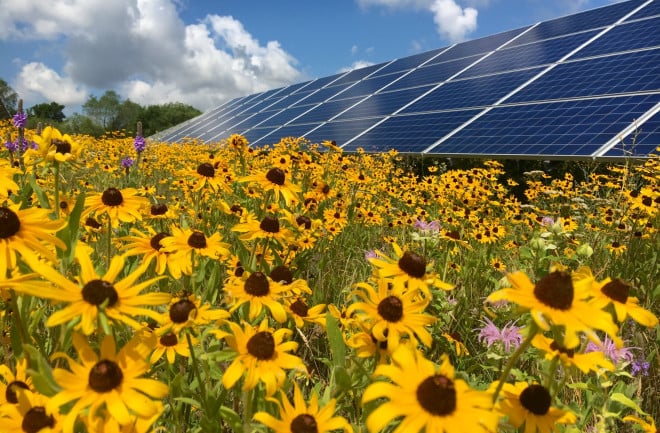Utility EDF Renewables and environmental management consultancy Nature Positive are working with Exeter University to research the ecological impacts of solar farms.
Researchers from the University of Exeter’s Environment and Sustainability Institute (ESI) will focus on EDF’s upcoming Longfield Solar Farm project and investigate what impacts large-scale solar farms could have on soil health, fauna, wildlife habitats and carbon flux . A 50-hectare experimental area on the site will allow researchers to test different management regimes and compare their results with undeveloped agricultural land. The research program will start later this year and will span six years, allowing part-time PhD students to take action before, during and after development.
The findings from this research project will influence future environmental initiatives at Longfield Solar Farm, a 350-400 MW solar farm with shared battery storage expected to begin main construction next year.
Announcing the partnership, Matthew Boulton, director of solar, storage and private wire at EDF Renewables UK, said: “This research is critical to our commitment to balance the creation of renewable energy with the protection of our important green spaces and we are pleased to be working with the University of Exeter to make this possible. Having robust data will be invaluable for measuring the proven biodiversity improvements we are already making, while also informing future decision-making to maximize biodiversity improvements at each of our solar farms.”
Jon Bennie, director of education and student experience at the University of Exeter added: “If managed properly, solar farms offer significant opportunities to provide habitats for wildlife, increase biodiversity and promote healthy soils and ecosystems in to stand. This long-term research will allow us to study the potential benefits and challenges of constructing and operating solar farms, allowing management decisions to be made to maximize these environmental benefits and minimize potential risks.”
Mark Lang of Nature Positive commented: “Although solar farms have become increasingly important in meeting the national need for renewable energy, the potential benefits they could have in improving biodiversity and providing other ecosystem services are so far poor. understood. It is hoped that the research will contribute to the collective understanding of how solar farms can be effectively managed to increase biodiversity, thus influencing current best practice in the fast-growing solar industry.”
Biodiversity on solar farms: a growing research focus
Research into the impact that solar parks can have on local biodiversity has been on the rise in recent months.
A study by Lancaster University PhD candidate Hollie Blaydes, supported by Solar Energy UK, recently called solar farms “paradises for biodiversity” and noted that they could play an “important role” in nature recovery. The study reported sightings of numerous vulnerable species on the Red List, including yellowhammers, bruisers, starlings and brown hares, spread across 87 solar farms.
Blaydes is conducting further research into biodiversity on solar parks, this time supported by the sustainable energy company Low Carbon. The new research will be carried out at the Westmill Solar Park in Oxford and will continuously assess the presence of pollinating insects on the farm.


